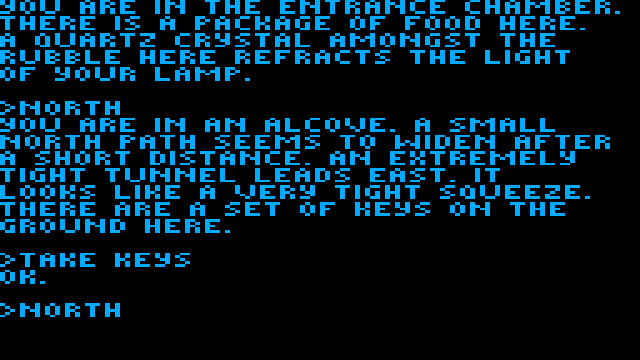At The End of the Road
"You are standing at the end of a road before a small brick building". One of the iconic quotes from video game history. I'm talking of course about Adventure, the original... well, 'adventure'.
It's not as personally meaningful as, say "You are in an open field west of a white house". For one thing, I don't know when I first played the game. I was first exposed as a very young age to Dungeon at a computer exhibit at the science center in the late 1970s, and then cut my teeth on some of the famous Scott Adams adventure games on my Texas Instruments 99 4/A computer. My familiarity was probably originally with my copy of the Book of Adventure Games - which, like Dungeons and Dragons' 1st edition of Deities and Demigods, was my starting point for a lot of interests.
Recently, I've had the itch to go back and play those early games, even the ones I've never done. I've actually completed all the Scott Adams games (which I'll probably talk about later), but Adventure aka Colossal Cave was of particular interest because I had recently played the decidedly non-gamelike game Kentucky Route Zero, which delves literally into the inspiration and analogs to the game - Mammoth Cave itself, and a very Adventure-like game on an old mainframe sitting in a real version of the "Hall of the Mountain King" - nested games.
I do remember playing some of its closest relatives - the Atari Adventure, which supposedly was supposed to be based on it (I guess... in the vaguest sense possible? Certainly there wasn't a bridge that could cross through walls), and on my cousin's TRS-80 computer, Pyramid 2000, a truncated version of Adventure rethemed to an Egyptian motif. I've also been trying out some of the variations - the expansions that various people did over the years - and finishing up with the UK equivalent, the very nasty Acheton. (Down the line, I plan to revisit the biggest commercial success of its immediate descendants - Zork).
But let's talk the original cave.
It's really more of a travelogue than a game in many ways, which - historically - was what it was supposed to be in the beginning. Even with the limited text, the visuals are evocative; certainly for a kid without a familiarity with Mammoth Cave, they are quite imaginative. The early crawl from the grate, down the pit and to the Hall of the Mountain King has burned a pathway into my mind that competes with the mental map of Zork I for space.
It also sets the tone for the weird MIT-style fantasy that adventure games tend to favor - magic spells and dragons are shoulder to shoulder with battery-powered lanterns and vending machines. Straight fantasy almost feels quaint by comparison.
It has some of the hated cliches that would haunt adventure games to this day - the infamous 'twisty little passages', having to deal with inventory issues, a limited power source, and random death (in the form of evil dwarves in this case). Having said that, they aren't really too unfair - the classic 'mapping with dropped items' works fine, and one of the two mazes doesn't even require that if you read the text carefully enough.
Lastly, the puzzles - most are pretty fair and somewhat logical. There are also not that many of them, to be honest; a number of the treasures to find are just lying right there to pick up. There are some that I would rate a bit unfair - one treasure requires you figure out a magic word that is, technically, a real word that you would never have to say normally; but there's some devilishly clever ones as well. I would certainly rate the troll bridge as a brilliant one, as it nominally requires two treasures to get to and return from another area with two treasures. There's a method to foil the troll that you can figure out when you're across the bridge, but to get across to begin with is a rather fun puzzle. However, the less said about the really unfair endgame, the better.
In the end, the game can be forgiven for a lot as it was the first - and the harbinger of everything to come. Even so, it's still a fun little adventure to play again.




Comments
Post a Comment